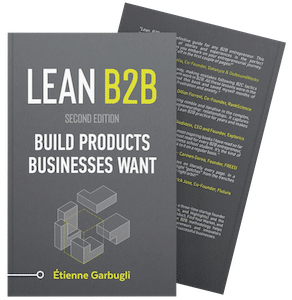“You can’t improve anything without feedback. If you put it out there, how do you know if it’s any good? How do you know people like it? You need some way to figure that out. If you can’t figure that out then you’re going to keep making changes that don’t necessarily align with what changes you should make to make it better.” – Hiten Shah, Serial Entrepreneur
The two biggest challenges of early products are:
- getting enough feedback to iterate and learn fast; and
- selecting the right voices to listen to.
It might not be obvious early on, but these challenges are both intertwined.
You can increase the volume of feedback you get by loosening your standards for the profiles of users you listen to. But while in the short run this may feel like a good idea, it can lead you to build a product that lacks clear focus.
Conversely, you can be too strict in terms of the voices you listen to, and this will drastically limit the speed at which you’re able to learn and iterate your early products.
It’s important to find the right balance. Too often, product teams learn from a very specific market, niche, or customer group—and then, when the product launches, they open the floodgates and feedback comes pouring in from folks with different needs and backgrounds.
If too much importance is placed on all this feedback, the result may be the creation of a bloated product that doesn’t fully meet anyone’s needs. Averages make terrible products.
It’s easy to get sidetracked when you don’t have a clear strategy for learning from early users. A launch on Product Hunt, social media posts, or shout-outs in your network will most likely bring volume, but not qualified leads.
The 3 Types of Feedback That Hurt Early Products
More specifically, you need to steer clear of feedback from:
- Friends, family, and contacts who ‘owe you a favor’: These groups won’t use your product for its core benefit. Because they know you, or have a vested interest in maintaining a good relationship with you, they most likely won’t give you the objective truth.
- The vocal minorities: Serial entrepreneur Dan Martell calls the people who shower you with compliments without actually using your product the vocal minorities. These people can be great advocates for your product, but you should always avoid building products for them.
- Companies looking for consulting: In B2B especially, there’s a pull early on to jump into services. You want to make prospects happy, but they have their own needs and agendas. It’s very easy to lose sight of your vision. You have to learn to say “No” and commit to building a single product, not custom integrations for each customer.
The days of shelfware, products bought by IT and used by no one, are over. It’s critical that your product is actually used, because if prospects don’t use it, then they won’t recommend it—and your business won’t grow.
At this stage, you should align the value proposition and benefits you sold with the value experienced in the product. To reach product/market fit, your early products need to deliver real value.
More on Early-Stage Products
- How Psykler Used Spreadsheets to Validate Early Product Demand
- [ Interview ] Serial Entrepreneur Dan Martell on Learning From Early Product Engagement
- How to Discount your Product to Land Early Customers
Download the First 4 Chapters Free
Learn the major differences between B2B and B2C customer development, how to think about business ideas, and how to assess a venture’s risk in this 70-page sampler.
Working on a B2B Startup?
Learn B2B customer development with our free email course:


